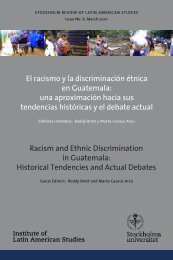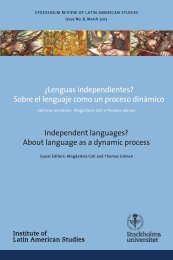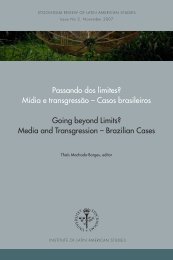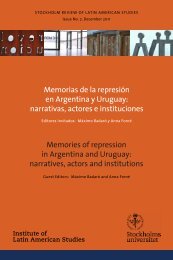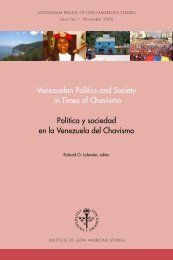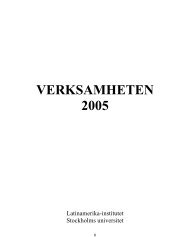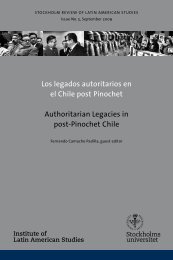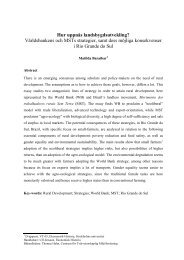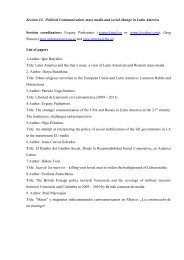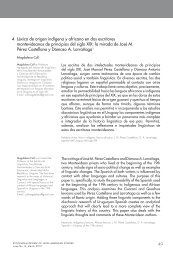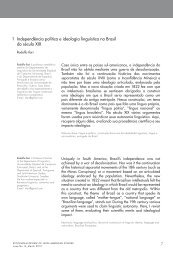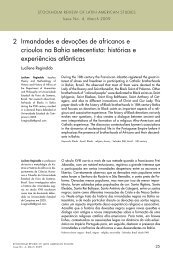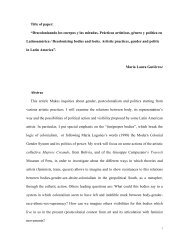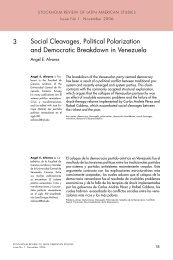Papers - Conference 2009 - Institute of Latin American Studies
Papers - Conference 2009 - Institute of Latin American Studies
Papers - Conference 2009 - Institute of Latin American Studies
You also want an ePaper? Increase the reach of your titles
YUMPU automatically turns print PDFs into web optimized ePapers that Google loves.
has been to occupy unproductive land (Carter 2003). MST‟s land occupations – since they hadproven to be successful (see Carter 2003: 8f) – quickly became the dominant way in which tostruggle for agrarian reform (Servolo de Medeiros 2007: 1504). From being active in one or afew states in the early eighties, the movement is now active in 23 out <strong>of</strong> 26 states (Vanden2003: 328; MST.org.br) and has over one million members (Wittman 2008: 121:MSTbrazil.org). MST has also, as a result <strong>of</strong> their own actions, won land titles for more than350 000 families (MSTbrazil.org[a]).The coming <strong>of</strong> the global neo-liberal discourseSince the early eighties the global political economy has gone through quite radical changes.David Harvey argues that there has been a shift from what he calls a “mode <strong>of</strong> regulation” to“flexible accumulation” (Harvey 1989 in Gledhill 2004: 332). These changes are due to bothtechnological advancements and political decision making. An important historical event thathas contributed to the global political economy <strong>of</strong> today was the establishment <strong>of</strong> the BrettonWoods trade and monetary regime in the end <strong>of</strong> the second world war. A conclusion takenfrom the two world wars was that military peace was closely related to, and dependent on,economic peace (Moon 2008: 107; Batiuk 2008: 121). The new regime therefore emphasizedthe importance <strong>of</strong> private actors and international trade freed from governmental control.This, advocates argued, would maximize global welfare (Moon 2008: 97).As a result <strong>of</strong> Bretton Woods, restrictions were gradually removed. In the 1980s, however,with Margaret Thatcher and Ronald Reagan in the political frontline, a neo-liberal – or“market fundamentalist” (to use George Soros‟ terminology) – model took place (Soros 1998:xx). This neo-liberal approach is also known as “the Washington consensus”. The idea behindthis approach was that the economic progress that had been achieved in Europe and Japanthanks to the Bretton Woods regime could also – by the help from the US, IMF and the WorldBank – be achieved in less developed countries (see Batiuk 2008: 127 and Becker 2007:204f). Promotion <strong>of</strong> this model meant promotion <strong>of</strong> a global expanded “free trade” economyand, hence, an expansion <strong>of</strong> production and consumption. 5 As a result, a system <strong>of</strong> massproduction,mass consumption and mass-disposal developed, and has become what someobservers consider to be nothing “[…] less than sheer economic necessity” (Renner 2004: 96).5 Although “free trade” is frequently used in discussions concerning the global economic system, the term ishighly questionable; or as Joseph E. Stiglitz puts it, “[t]ruly free markets for labor or goods have never existed”(Stiglitz 2001: ix).3



